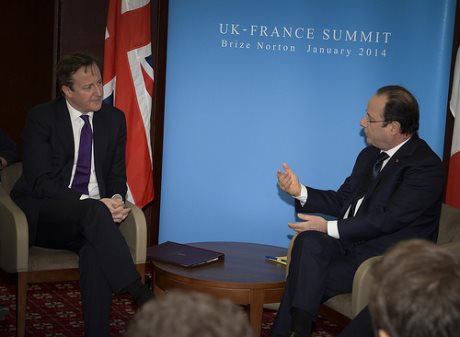The governments of the UK and France will work together to show that the proposed Hinkley Point C nuclear power plant does not violate European rules for state aid, according to a joint communiqué reiterating their shared commitment to nuclear power.
 |
| David Cameron and Francois Hollande meet at the UK summit (Image: The Prime Minister's Office) |
The declaration outlining how the two nations plan to collaborate on the construction of new nuclear capacity was issued during a bilateral summit hosted in Oxfordshire in the UK. The meeting was attended by UK prime minister David Cameron and French president Francois Hollande as well as high-ranking ministers from both countries' governments.
France and the UK both pushed for recent European Commission proposals for a target of 40% for greenhouse gas emissions reductions across the European Union by 2030. The UK's Department of Energy and Climate Change (DECC) said that the latest declaration underlines the two nations' belief that nuclear power is "critical" player in a "cost-effective low carbon transition."
Specifically, the two governments have agreed to "engage constructively" with the European Commission's ongoing consultation on the validity of proposed UK state aid for the construction by EDF Energy of two Areva EPR units at Hinkley Point C. Although European guidelines allow such state support for renewables, no such guidelines currently exist for nuclear projects, so state aid for nuclear investments must be considered on a case-by-case basis.
In addition to bilateral collaboration on the construction of new nuclear power plants, the declaration paves the way for maximising opportunities for small and medium enterprises (SMEs) in nuclear supply chains, development of the nuclear workforce through joint-funded training and skills centres and collaboration to enhance civil nuclear emergency planning and security. The nations also agreed to work together to build more electricity interconnectors between the UK and France.
A list of deliverables from the summit includes an agreement between the two countries' national industrial associations, the UK's Nuclear Industry Association and Partenariat France Monde Electricité, to sign a memorandum of understanding with a view to helping their SME members develop their business interests in both countries and overseas.
French support for NNL
The UK's National Nuclear Laboratory (NNL) has already announced the signature of three agreements with key French nuclear organisations as outlined at the summit. A letter of intent with Areva will see the organisations work together to develop nuclear fuel cycle technology, while a letter of intent with the France's CEA will build cooperation in advanced fuel and reactor technologies, particularly with regards to the Astrid fast reactor. With EDF, the NNL is to develop a strategic R&D alliance including expanded collaborations between EDF Energy and UK academic institutions.
Researched and written
by World Nuclear News




_87299.jpg)
_52351.jpg)








